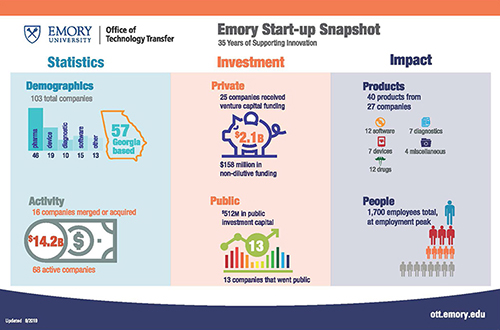In 2014, OTT published a comprehensive survey of all start-up companies founded on Emory intellectual property. The results proved Emory to be an economic hub in the South, generating not only private and public investment capital, but also job growth and life-saving products. Across the 72 companies surveyed at the time, 1,200 workers had been employed at peak, mostly in the areas of drug development, diagnostic materials, and software-based products. These start-ups cumulatively raised more than a billion dollars in funding and brought 30 different products to market. Now, five years later, OTT has updated its survey, unquestionably demonstrating the importance of tech transfer in an academic settings.
The updated survey covers 103 companies, indicating that 31 start-ups were founded in only the past five years. Impressively, roughly 85% of Emory’s start-ups were founded after the year 2000. These figures indicate the ways in which success begets success and the impact that the support provided by the office to the University’s budding entrepreneurs. There is a curiosity that follows the idea of starting your own company that is present with academic researchers too. OTT has matched this growing interest with a number of support programs aimed, such as the Kauffman course. The office has also worked to connect young start-ups with financiers and networking opportunities via the Start-Up section on the OTT website, which outlines regional resources, provides thorough advice, and contains a directory of previous Emory start-ups.

Since 2014, three more Emory companies have gone public, raising about $200 million more in public investment dollars. During the same time period, Emory start-ups doubled their private investments, bringing their total to $2.1 billion. Ten more products came to market from Emory companies in the past five years for a total of 40 products. These were developed by 27 different companies, showing that Emory start-ups often find success, continue to develop and market new discoveries. Additionally, seven more companies merged or were acquired, totaling 16 companies generating $14.2 billion. These gains have worked to benefit the local community, as more than half of Emory’s start-ups operate out of Georgia. At some point during the past few years, at their peak, Emory companies collectively employed 1,700 people. Of the 103 companies studied by OTT, 68 are still active and operate today, meaning two-thirds of Emory start-ups have survived.
The update to the start-up survey once again proves Emory’s excellence in this area. The University’s vastly talented researchers find entrepreneurial resources and business connections and are guided by the hard-working professionals in OTT. These results show that Emory continues to grow even faster than before. Such news could only mean that there are bigger discoveries and more exciting innovations ahead.